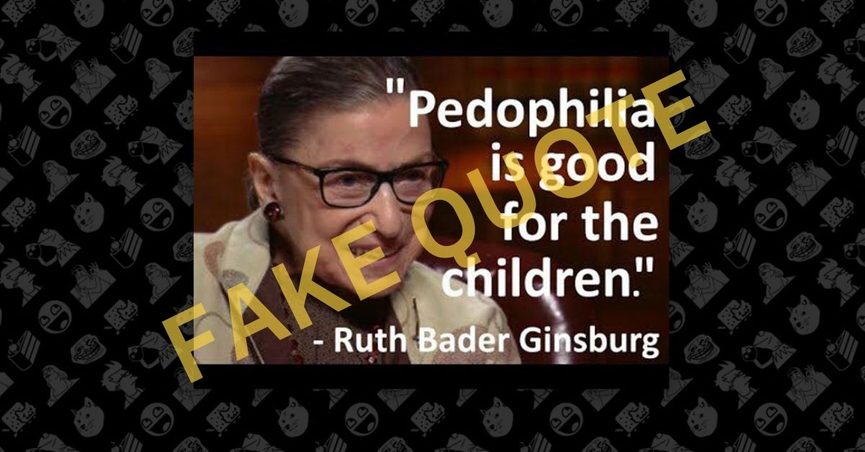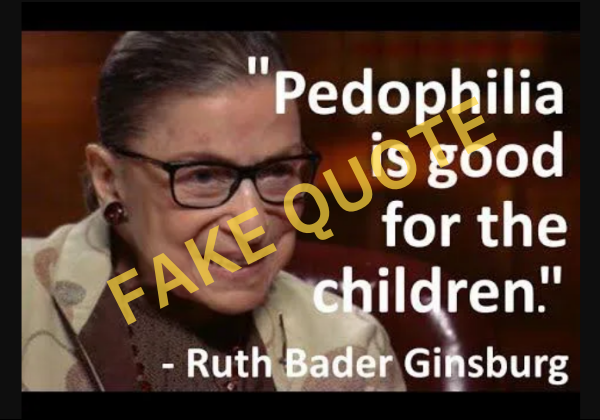1974 年由露丝·贝德·金斯堡共同撰写的一份关于美国法律中的性别偏见的报告被严重误解。
【宣称】
露丝·贝德·金斯堡说,恋童癖是好的儿童。
【结论】
假

【原文】
The language in a 1974 report that was co-authored by Supreme Court justice Ruth Bader Ginsburg, has been analyzed and criticized for more than four decades. The piece tackled sex bias in the United States penal code. As these critics have devolved from scholars, to senators, to pundits, to conspiracy-minded web sites, to the lowly meme maker, the accusations against Ginsburg have grown more crude and distorted.
In February 2018, for instance, we came across a meme featuring an image of the Supreme Court Justice and a quote ostensibly uttered by her about pedophilia being good for children:
This is not a genuine quote from Ruth Bader Ginsburg.
This claim is based upon a gross misinterpretation of another misinterpretation, which was itself based upon a simple misreading of a 1974 report entitled “The Legal Status of Women Under Federal Law” that was co-authored by Ginsburg, who at the time was a professor of law at the Columbia Law School. The other co-author was Brenda Feigen-Fasteau, a former director of the American Civil Liberties Union’s women’s rights project.
However, Ginsburg never actually said that the age of consent should be lowered to 12.
Ginsburg’s report was about changing gendered language, not the age of consent, in our existing laws. In the quoted passage, she was not arguing for or against lowering the age of consent; rather, she was quoting a proposed Senate bill as an example of how appropriate gender-neutral pronouns should be used. Ginsburg wrote that she used this bill because it “conform(ed) to the equality principle,” not because she agreed with the presented age of consent.
Furthermore, Ginsburg mentioned another section of the penal code a few paragraphs earlier which referenced a different age of consent: 16. In both cases, Ginsburg’s focus was on the gender of the victim, rather than the age, as her report was specifically concerned with gendered-language in U.S. law:
18 U.S.C. § §1154 and 2032 make it a crime for a person to have carnal knowledge of a female, not his wife, who has not attained the age of sixteen years.
[…]
The “statutory rape” offense defined in these sections follows the traditional pattern: the victim must be a female and the offender, a male. Protection of the girl’s virtue as an asset to be traded by her family at marriage time can no longer survive as a justification for such provisions. The immaturity and vulnerability of young people of both sexes can be protected through appropriately drawn, sex-neutral proscriptions.
The claim that Ginsburg said that “pedophilia was good for children” appears to be the result of a decades-long game of telephone that started with a misreading of a 1974 report.
It started in 1993, after Ginsburg was nominated to the Supreme Court, when this report was quoted out of context as evidence that Ginsburg wanted to lower the age of consent to 12. As this errant argument was reiterated by pundits such as Sean Hannity it morphed from a single out of context quote to an alleged personal belief at the core of Ginsburg’s political views. When the “Pizzagate” controversy exploded during the 2016 presidential election, this rumor underwent another devolution as conspiracy theorists claimed that Ginsburg once wrote that she wanted to legalize child rape.
In February 2018, this rumor took one more step away from reality when a meme featuring a quote ostensibly uttered by Ginsburg arguing that pedophilia was good for children went viral online.
